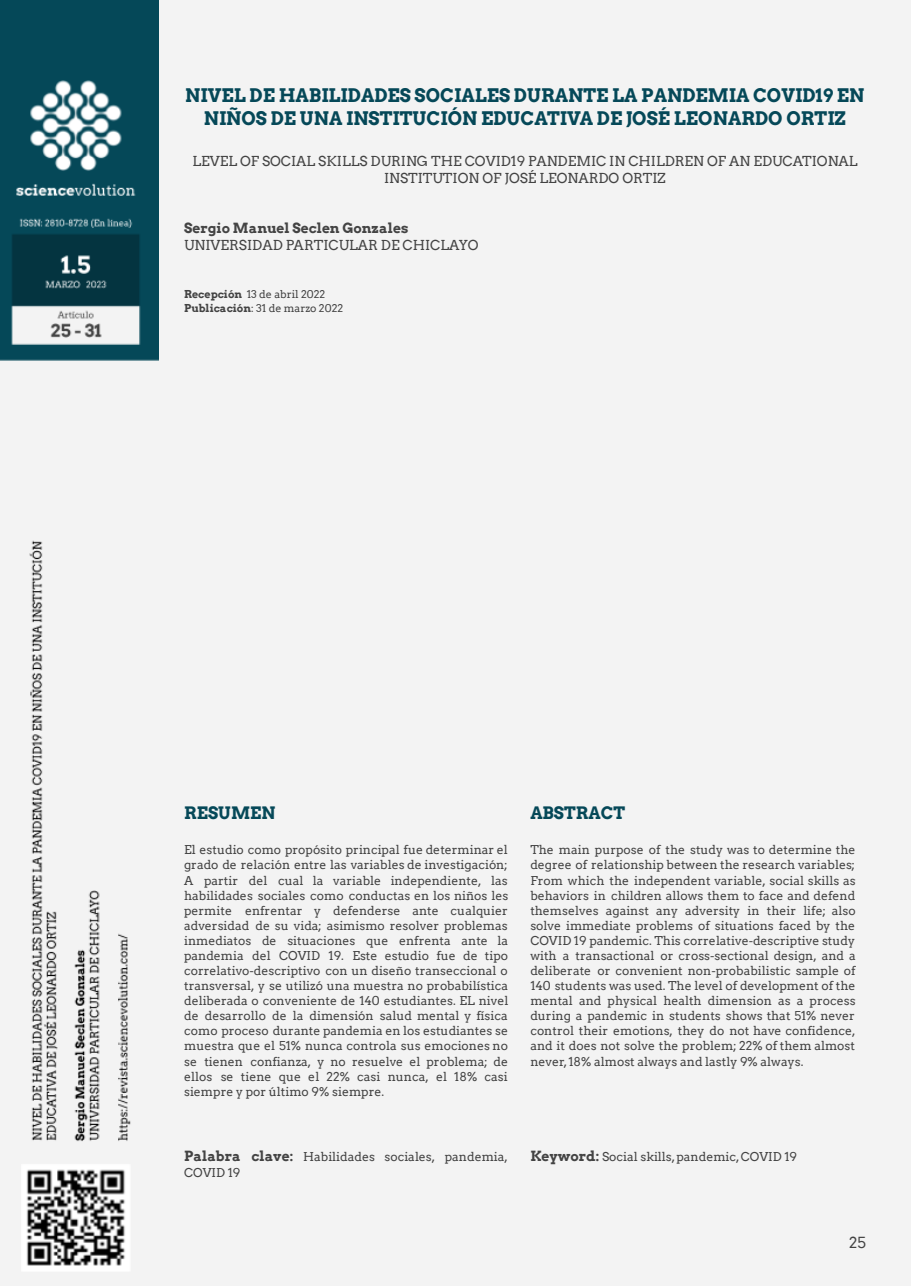Abstract
The main purpose of the study was to determine the degree of relationship between the research variables; From which the independent variable, social skills as behaviors in children allows them to face and defend themselves against any adversity in their life; also solve immediate problems of situations faced by the COVID 19 pandemic. This correlative-descriptive study with a transactional or cross-sectional design, and a deliberate or convenient non-probabilistic sample of 140 students was used. The level of development of the mental and physical health dimension as a process during a pandemic in students shows that 51% never control their emotions, they do not have confidence, and it does not solve the problem; 22% of them almost never, 18% almost always and lastly 9% always.
References
Balluerka, L. (2020) Características de una comunidad resiliente ante los desastres.
Brooks, S. et al. (2020) The psychological impact of quarantine and how to reduce it: Rapid review of the evidence. The Lancet, 395(10227), 912-920. doi:10.1016/S0140-6736(20)30460-8
CEPAL/UNICEF (2020) Impacto de la Pandemia COVID-19 en las familias con niños, niñas y adolescentes. Buenos Aires: UNICEF
Calleja, D. (2016) Effective Social and Emotional Learning Programs-Middle and High School Edition. Recuperado el 17 de noviembre de 2016, de: http://www.casel.org/middle-and-high-school-edition-casel-guide/
Espada, J. et al., (2020) Buenas prácticas en la atención psicológica infantojuvenil ante la COVID-19. Clínica y Salud. Avance online. doi:10.5093/clysa2020a14
Hernández, R. F. (2014). Metodología de la investigación (6 ed.). Jalisco: Mc. Graw Hill Education
Huarcaya, J. (2020) Consideraciones sobre la salud mental en la pandemia de COVID-19. (Tesis posgrado) Universidad de San Martín de Porres. Lima.Perú
Jiménez, D. (2020) resiliencia en adolescentes y jóvenes del programa de formación y empleo de la fundación Forge Lima Norte. (Tesis de posgrado) Universidad Nacional Federico Villarreal. Lima. Perú.
Kelly, T. (2017) Elementos para el Diseño de Técnicas de Investigación: Una Propuesta de Definiciones y Procedimientos en la Investigación Científica. Tiempo de Educar.
León, R. et al. (2018) Las habilidades socioemocionales, no cognitivas o “blandas”: aproximaciones a su evaluación. Revista Digital Universitaria (RDU). Vol. 19, núm. 6 noviembre-diciembre. DOI: http://doi.org/10.22201/ codeic.16076079e.2018.v19n6.a5.
OMS (2020) World Health Organization. Global Surveillance for human infection with coronavirus disease (COVID-19). InterimGuidance. Suiza: Recuperado: https://www.who.int/publicationsdetail/global-surveillance-for-human-infection- with-novel-coronavirus-(2019-ncov
Organización Mundial de la Salud (OMS; 2020). Coronavirus (COVID-19). Recuperado: https://covid19.who.int/
Orgilés, M. et al., (2020) immediate psychological effects of the COVID-19 quarantine in youth from Italy and Spain. Recuperado: https://psyarxiv.com/5bpfz/
Otero, F. (2017) competencia socio emocional del maestro en relación al estudiante y los resultados del aula”, Revista de Investigación Educativa.
PRONABEC (2020) institución del Ministerio de Educación del Perú. COVID-19 en Perú. MINEDU: SIBEC

This work is licensed under a Creative Commons Attribution-NonCommercial-NoDerivatives 4.0 International License.
Copyright (c) 2023 http://revista.sciencevolution.com/

